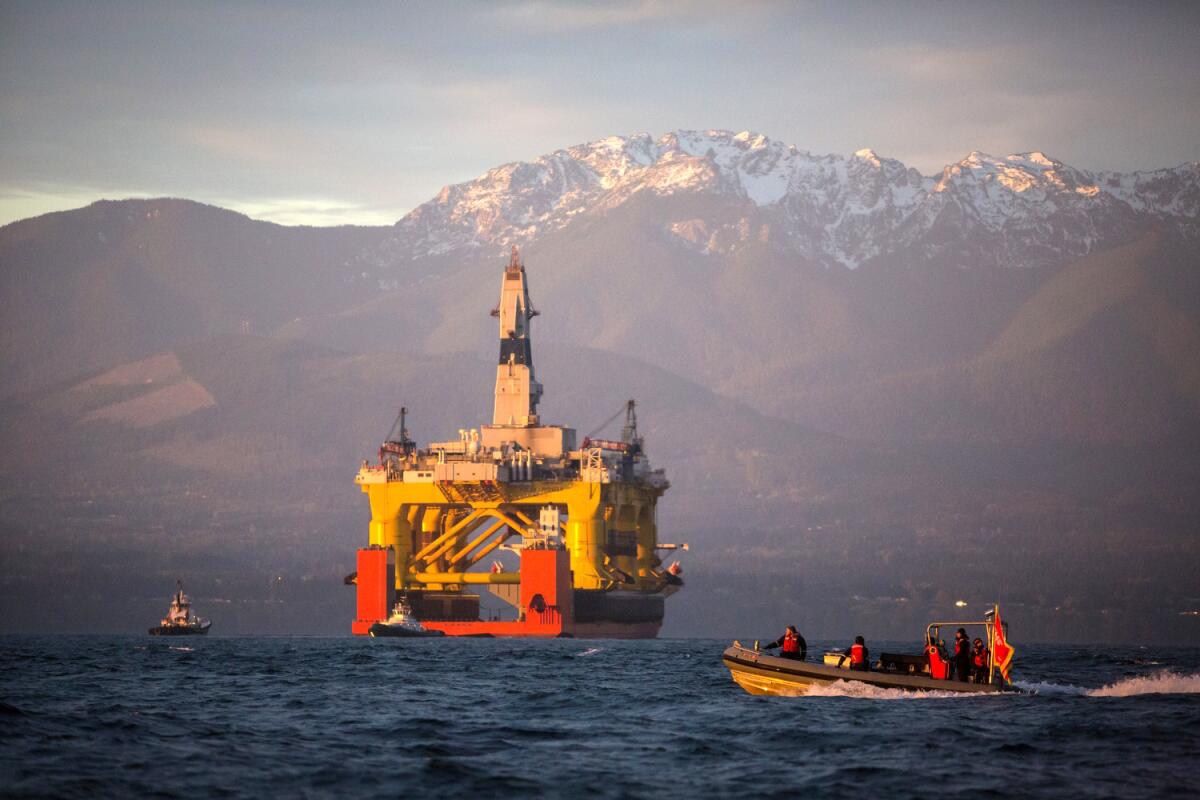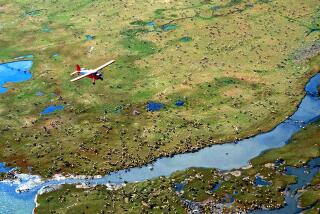Shell hopes to begin Arctic oil drilling project this summer

The Olympic Mountains provide a backdrop in April for a vessel carrying an oil drilling rig near Port Angeles, Wash.
- Share via
Reporting from Seattle — The Obama administration on Monday announced conditional approval for Shell Gulf of Mexico Inc. to resume its long and troubled efforts to drill for oil in the Arctic Ocean, prompting a backlash from environmental groups that warned of the risks of operating in the extreme conditions off Alaska.
Shell, which says it has spent about $7 billion on its exploratory efforts in recent years, hopes to begin drilling this summer, but there is no assurance that it will. The company had received federal permission to drill in the past only to see its plans interrupted by legal challenges, technical problems and the formidable perils of working in the remote Arctic.
Amid stormy conditions on New Year’s Eve 2012, a Shell drill rig broke free from a tow line and ran aground in the Gulf of Alaska. Last year, Shell abandoned plans to pursue summer drilling after a federal appeals court found that the permitting process had been flawed. This time, according to the Bureau of Ocean Energy Management, the federal agency that oversees offshore drilling, Shell and government regulators are better prepared.
The agency approved a Shell plan to drill as many as six exploratory wells, starting with two this summer, in a section of the Chukchi Sea called the Burger Prospect, about 70 miles northwest of the village of Wainwright, Alaska. The approval, although conditional, is essential to setting in motion a round of permitting that Shell must complete before it can begin drilling.
“We have taken a thoughtful approach to carefully considering potential exploration in the Chukchi Sea, recognizing the significant environmental, social and ecological resources in the region and establishing high standards for the protection of this critical ecosystem, our Arctic communities, and the subsistence needs and cultural traditions of Alaska natives,” Abigail Ross Hopper, the director of the Bureau of Ocean Energy Management, said in a statement. “As we move forward, any offshore exploratory activities will continue to be subject to rigorous safety standards.”
Environmental groups vowed to fight the plan, which still must meet conditions under the Marine Mammal Protection Act and the Endangered Species Act and be approved by the Bureau of Safety and Environmental Enforcement.
Opponents also are challenging Shell in other ways, including with a lawsuit questioning the company’s plan for responding to spills.
“As was unfortunately demonstrated in 2012, Shell is not prepared to operate in remote and unforgiving Alaskan waters,” said Michael LeVine, a lawyer for Oceana. “Today’s approval is further evidence that government agencies are willing to give in to Shell’s need to validate its investments rather than taking a hard look at the risks to important Arctic resources.”
The offshore Arctic is believed to hold as much as 26 billion barrels of recoverable oil. But the area is hundreds of miles from any major city and frequently lashed by brutal storms. It is environmentally fragile and home to rare species, including endangered humpback and bowhead whales.
Drilling there requires taking along virtually every piece of equipment needed for emergencies, including spills. A spokesman for Shell, Curtis Smith, said the company has increased the number of support vessels involved, to about 30, compared with about 25 in 2012, and developed a more integrated planning practice that includes greater oversight of contractors. A contractor was towing the vessel that ran aground, the Kulluk, when it broke free.
Shell expects more legal challenges as it pursues necessary permits, Smith said.
“Our confidence in the current plan we put together is high,” Smith said. “As a result, we’re planning to drill this summer unless a federal agency or court action determines we will not.”
Shell’s new plan comes amid a boom in oil production in the contiguous United States, where hydraulic fracturing, commonly called fracking, is being used to free oil from underground rock formations. That method has made the nation a new power in world markets but poses risks of its own, including endangering water supplies and causing earthquakes.
The surge in production and Shell’s plan conflict with the administration’s goal of reducing emissions that cause climate change, critics say.
“Not only does it put the Arctic’s pristine landscapes at a huge risk for oil spills and industrial development, but it’s utterly incompatible with President Obama’s rhetoric to address the climate crisis,” the Center for Biological Diversity said Monday.
In 2012, Shell did exploratory work in the Chukchi Sea and in the Beaufort Sea to the east. This time, it is proposing to drill only in the Chukchi, where it would operate two drilling vessels, the Noble Discoverer and the Transocean Polar Pioneer. The Kulluk is no longer in service.
Smith said the Noble Discoverer is scheduled to arrive in Everett, Wash., “in a matter of days.” The Polar Pioneer, which rises more than 300 feet above the water’s surface, has been moored in Port Angeles, Wash., and is scheduled to arrive in Seattle this week. The city, known for its environmental leadership, is not planning a warm welcome.
Last week, amid mounting public resistance to Shell’s plan to make the Port of Seattle its hub for Arctic drilling, Mayor Ed Murray announced that the company would need to seek a new city permit before proceeding. An opposition group, Shellno, is organizing what it hopes will be a flotilla of more than 1,000 kayaks for this weekend. Shellno expects some of its boats to meet the Polar Pioneer as it makes its way to Seattle.
“We’re not changing plans,” Smith said when asked about the protest. “We respect the choice that anyone might make based on our Arctic aspirations. We just ask that they do so within the boundaries of the law.”
Follow @yardleyLAT on Twitter for energy and environmental news.
More to Read
Sign up for Essential California
The most important California stories and recommendations in your inbox every morning.
You may occasionally receive promotional content from the Los Angeles Times.











